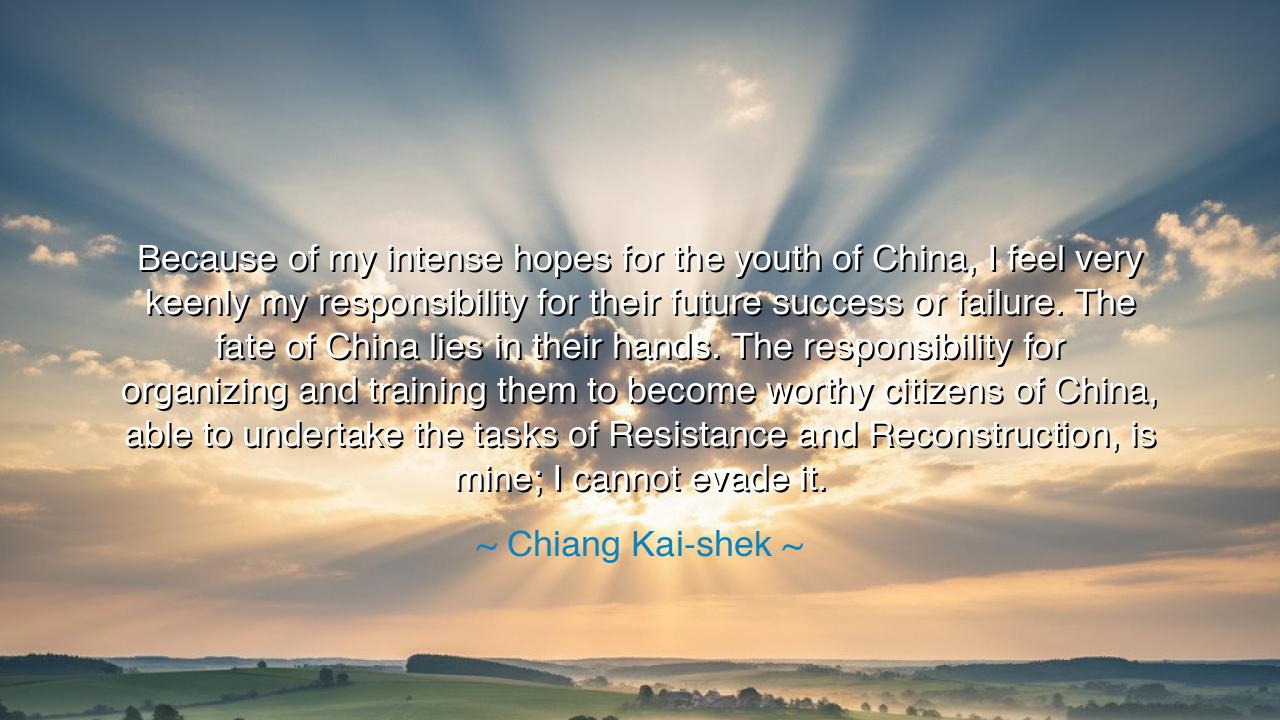
Because of my intense hopes for the youth of China, I feel very
Because of my intense hopes for the youth of China, I feel very keenly my responsibility for their future success or failure. The fate of China lies in their hands. The responsibility for organizing and training them to become worthy citizens of China, able to undertake the tasks of Resistance and Reconstruction, is mine; I cannot evade it.






Host: The room feels heavier now, the weight of Chiang Kai-shek’s words settling between Jack and Jeeny. The sense of responsibility, the acknowledgment of a deep duty to a nation’s future, brings a gravity to the conversation. Jack looks at Jeeny, his voice thoughtful as he reflects on the magnitude of Chiang’s statement.
Jeeny: "Chiang Kai-shek once said, 'Because of my intense hopes for the youth of China, I feel very keenly my responsibility for their future success or failure. The fate of China lies in their hands. The responsibility for organizing and training them to become worthy citizens of China, able to undertake the tasks of Resistance and Reconstruction, is mine; I cannot evade it.' That’s such a powerful statement. It’s not just about political leadership—it’s about molding the future, shaping the next generation. What do you think he’s expressing here?"
Jack: "I think Chiang is acknowledging the weight of responsibility that comes with leadership, especially in times of great challenge. The youth are the future, and he sees it as his duty to shape them into capable, strong citizens who can carry the country forward, especially in the context of Resistance and Reconstruction. It’s about legacy, but also about the practical reality that the success of a nation depends on its people—particularly the next generation. His leadership isn’t just about directing military or political action; it’s about training the future leaders, thinkers, and workers of China." He pauses, his tone more reflective. "It’s a deep sense of responsibility to prepare the youth to face the challenges ahead, and he clearly doesn’t see it as something he can avoid or delegate."
Jeeny: "Yes, it’s almost like he sees himself as the guardian of the future. It’s not just about building infrastructure or defeating an enemy—it's about building up the character and capabilities of the youth, because they’re the ones who will carry the vision forward once the current generation is gone. And there’s a certain humility in that, don’t you think? The idea that you’re responsible for shaping the potential of an entire nation—not just its physical future, but its cultural and moral future." She smiles slightly, her voice softening. "It’s not a responsibility that can be taken lightly."
Jack: "Absolutely. It’s a leadership philosophy that goes beyond just governing or commanding. Chiang’s sense of duty to the youth isn’t just about them being good citizens in a conventional sense—it’s about making them capable of facing the biggest challenges the country will face. Whether it’s war, reconstruction, or political reform, those young people are the ones who will have to pick up the mantle. And he recognizes that they can’t do it alone—they need guidance, training, and purpose. His words express an almost personal commitment to their success." He pauses, his expression serious. "It’s a reminder that the future of any nation doesn’t just depend on the actions of its leaders—it depends on the education, the character, and the determination of the young people who will eventually lead."
Jeeny: "That’s so true. I think Chiang’s words also point to the idea that leadership isn’t just about power—it’s about mentorship. The true strength of a leader is how they shape and inspire those who come after them. He’s recognizing that lasting change comes not from simply winning battles or implementing policies, but from creating a generation capable of continuing that work. The youth of China aren’t just the future—they are the ones who will make the future a reality." She smiles softly. "It’s a call to take responsibility, not just for the present, but for the generations to come."
Jack: "And I think there's a certain urgency in his words. He’s talking about immediate action—this isn’t something that can be delayed or left to someone else. His responsibility to the youth isn’t just about hope; it’s about practical, deliberate work. Training them, organizing them, preparing them for what’s to come. The weight of that responsibility must have been immense, knowing that the fate of a country rested in the hands of the people who would follow." He pauses again, his tone quieter now. "It’s a leadership perspective that looks beyond personal power to something much bigger—something that will outlive any one person."
Jeeny: "It’s incredible how much foresight and accountability is in his statement. He’s not just leading for the moment; he’s thinking about the long-term survival and flourishing of China. His vision isn’t just about political power—it’s about creating a society that can stand on its own in the face of adversity." She smiles, the words clearly resonating with her. "I think it’s a reminder for all of us that leadership is about building—building others, building the future, and building the next generation to be even better than the one before."
Host: The room feels still now, as Jack and Jeeny sit in quiet reflection on Chiang Kai-shek’s words. The responsibility he felt for the future of China, particularly the role of the youth in that future, is a powerful reminder of the deep duty that leadership entails—not just in shaping the present, but in preparing the next generation for the challenges ahead.
As the evening continues, their thoughts turn inward, realizing that true leadership is about mentorship, responsibility, and legacy. It’s about shaping the future not through power alone, but by investing in the people who will carry the work forward, long after we’re gone.






AAdministratorAdministrator
Welcome, honored guests. Please leave a comment, we will respond soon